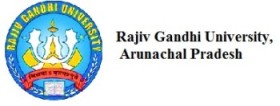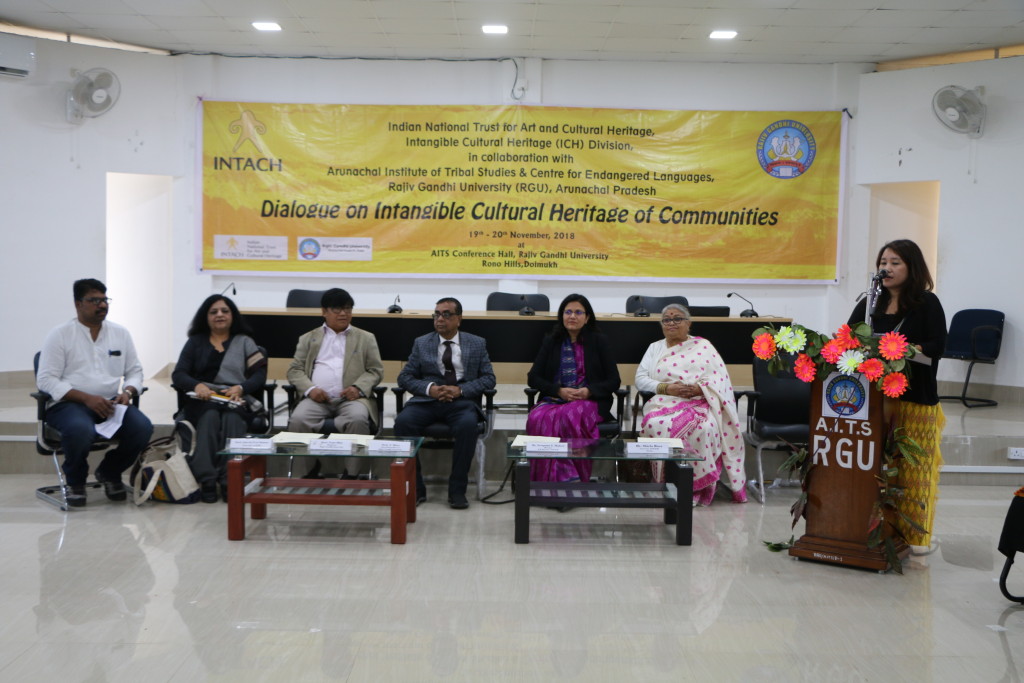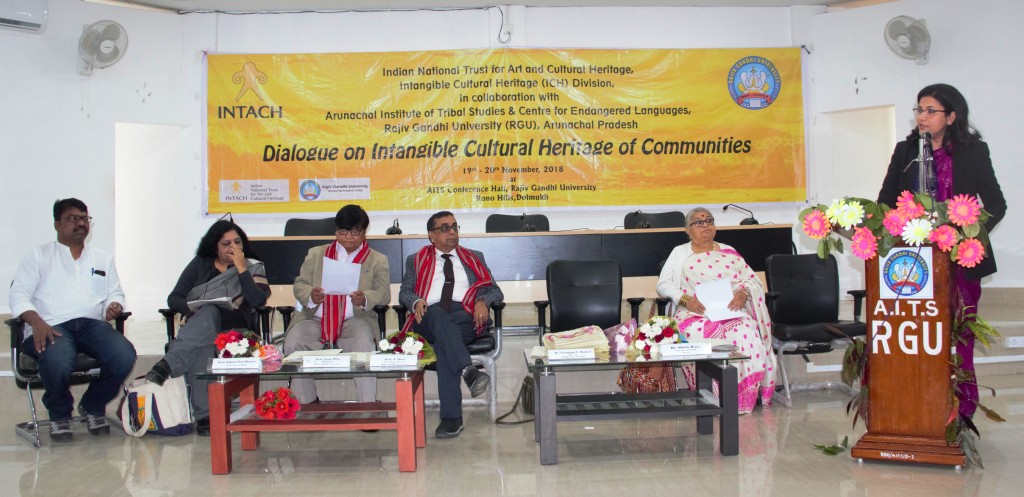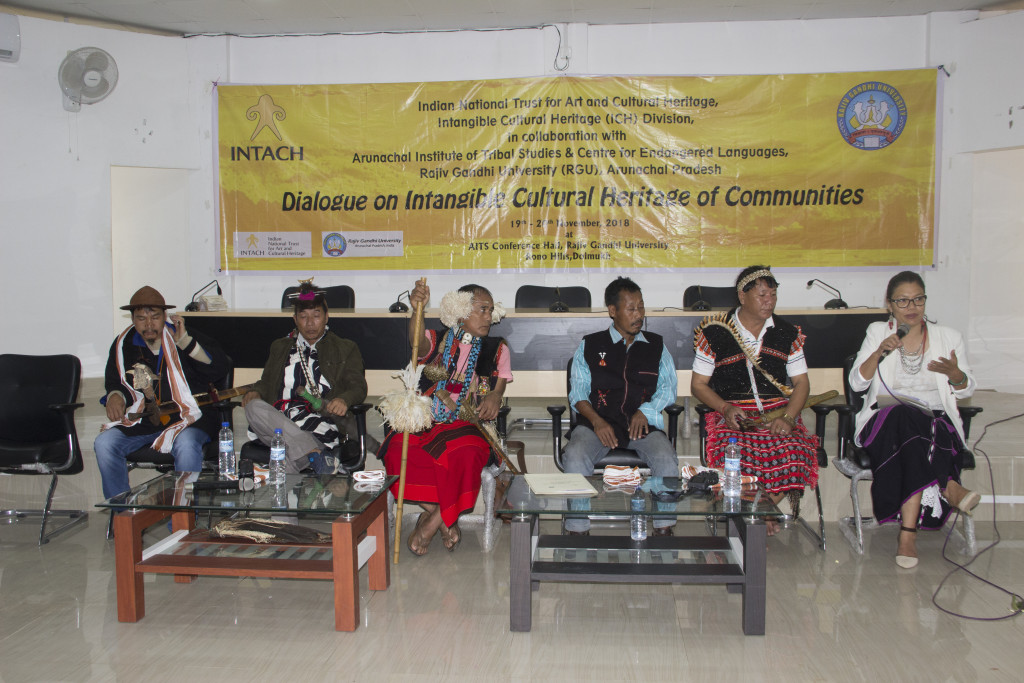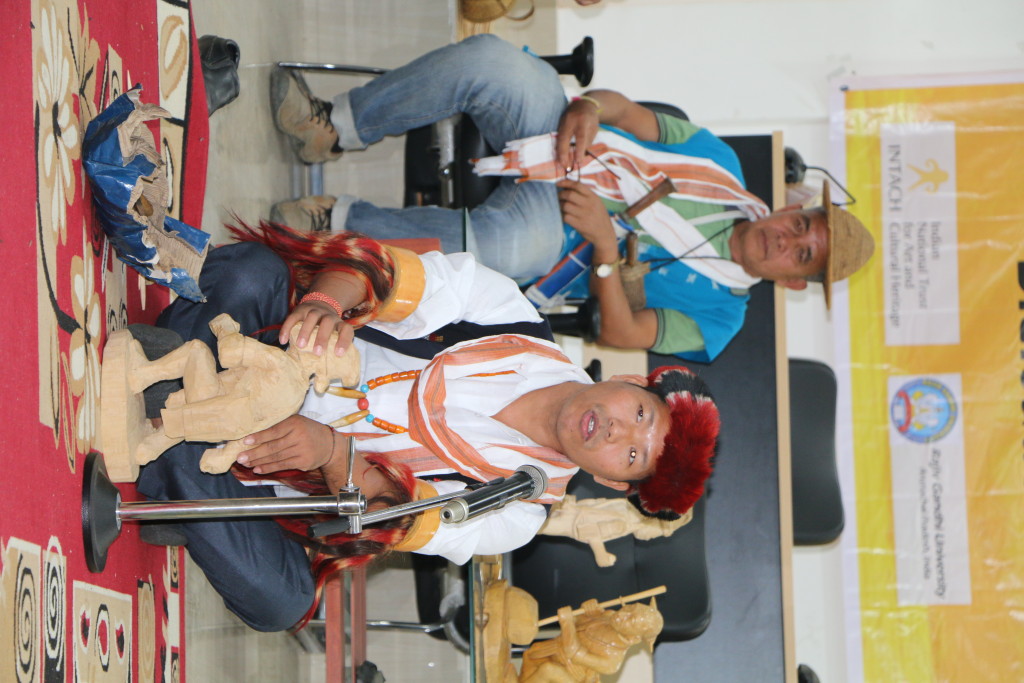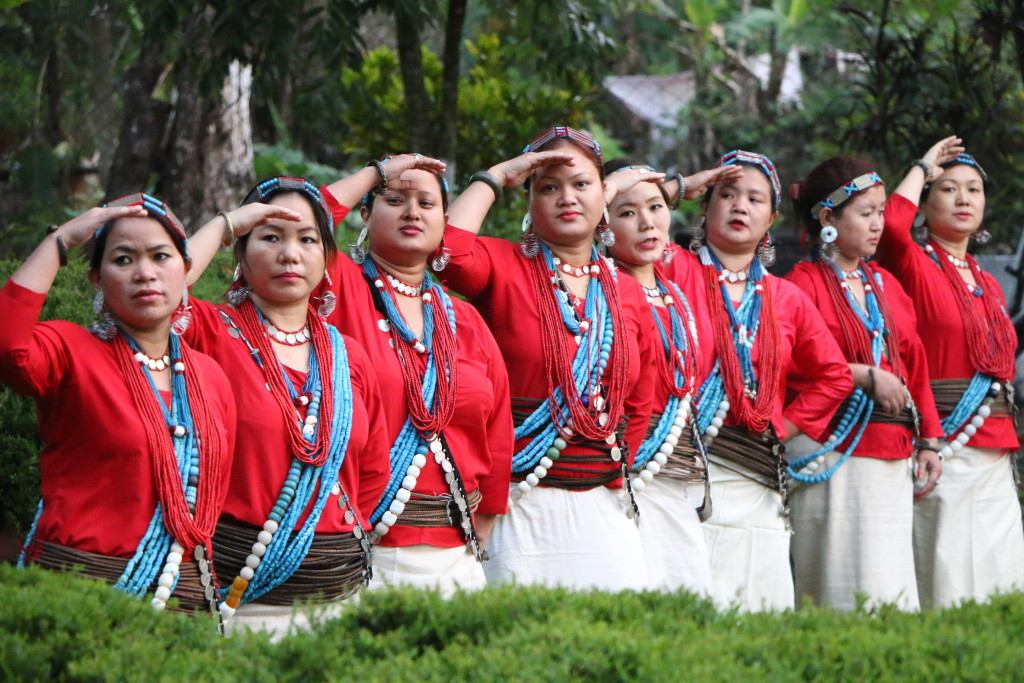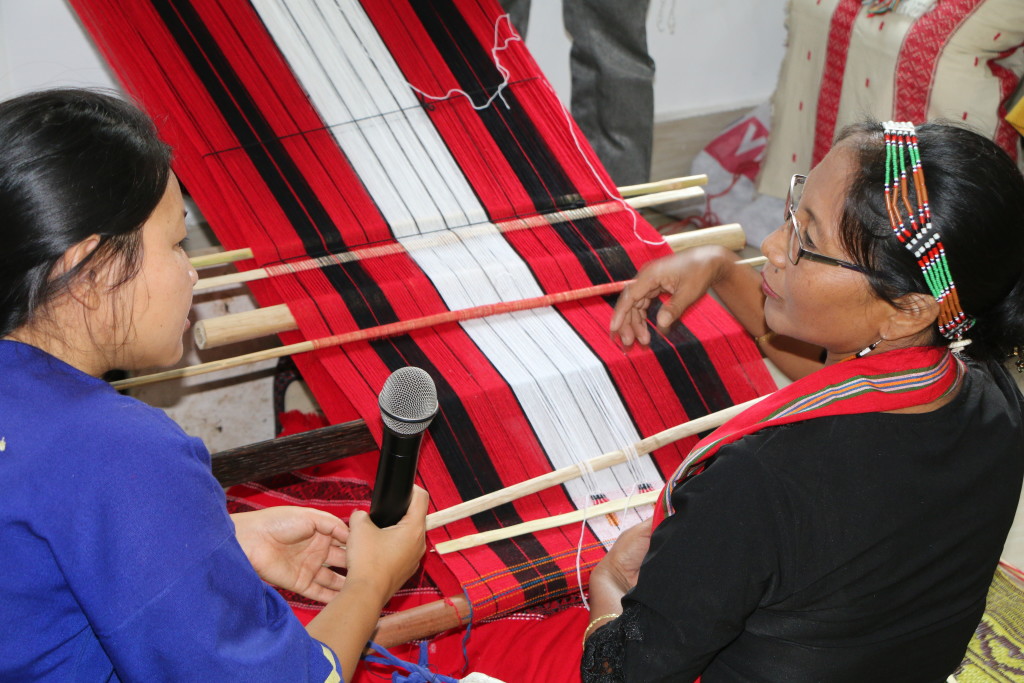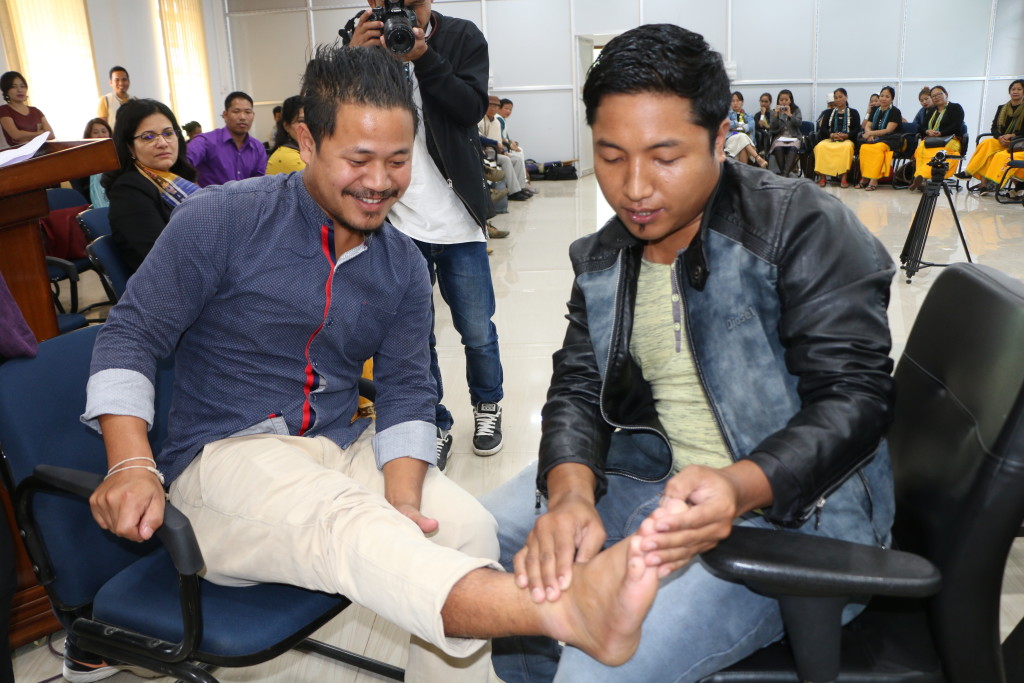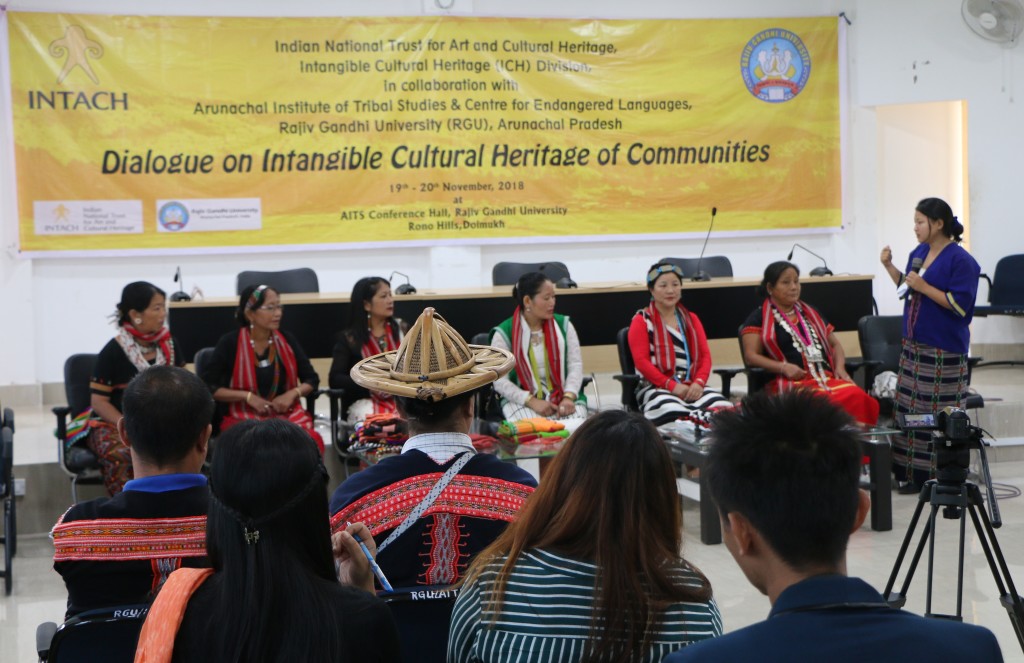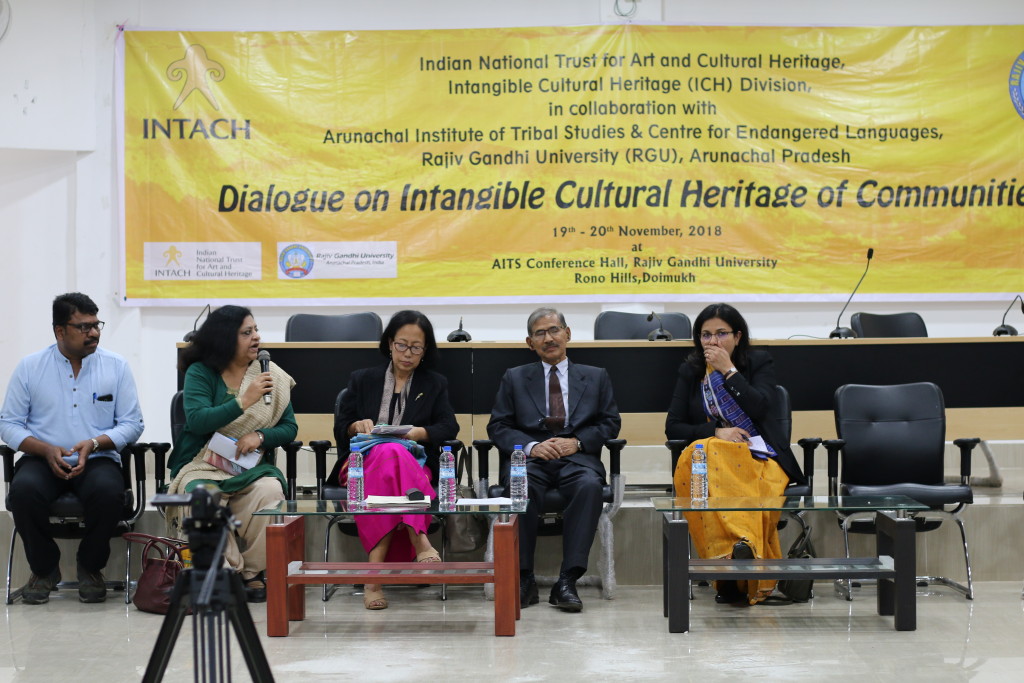‘DIALOGUE ON INTANGIBLE CULTURAL HERITAGE OF COMMUNITIES’ Back
‘DIALOGUE ON INTANGIBLE CULTURAL HERITAGE OF COMMUNITIES’
NOVEMBER 19-20, 2018
Organized by
INDIAN NATIONAL TRUST FOR ART AND CULTURAL HERITAGE
INTANGIBLE CULTURAL HERITAGE DIVISION
AND
ARUNACHAL INSTITUTE OF TRIBAL STUDIES & CENTRE FOR ENDANGERED LANGUAGES
RAJIV GANDHI UNIVERSITY
Arunachal Pradesh presents an interesting cultural mosaic. All the tribal communities have preserved their distinct language, knowledge systems, oral narratives, rituals, customary laws, performing traditions, food habits, customs and practices, fairs and festivals, arts and crafts etc. The rich cultural heritages of these tribal communities are orally transmitted and have always drawn attention of social scientists from various parts of the world to Arunachal. However, there is a vital need to have an interaction with the community culture bearers/ resource persons in order to understand their knowledge systems and the challenges they are facing in retaining their cultural heritage. In this regard, the two-day programme brought together the community resource persons from different regions of Arunachal Pradesh to Rajiv Gandhi University during 19 & 20 November, 2018 and provided a common platform to discuss, interact with each other and share their views.
Objectives:
- To bring together the community culture bearers like craftspeople, shamans, weavers, farmers, performers, artisans, healers etc from different regions of Arunachal Pradesh to a common platform in order to interact and share their knowledge systems
- To understand and document the issues, transformations observed over time, and challenges faced by the community culture bearers
- To discuss an appropriate approach for the preservation and dissemination of cultural heritage.
Welcoming the participants and guests
The first day started with the welcoming of participants and guests from different communities of Arunachal Pradesh and other Institutes and Universities. The programme for the first day began with the welcome speech by Prof. Simon John, Director of AITS. Speaking on the occasion of the Inaugural Ceremony, the Chief Guest, Prof. A. Mitra, (Vice Chancellor In Charge, Rajiv Gandhi University, Arunachal Pradesh) emphasized the mandate of AITS and also the importance of organizing such programmes along with academic works and research. He also mentioned how collaborations with the communities are essential to bring in more constructive output.
Ms. Nerupama Y. Modwel (Principal Director, ICH Division, INTACH) talked about how maintenance of heritage and community memories are essential, and steps to preserve and understand them should be taken seriously. She mentioned INTACH’s continuing role in this effort and stressed on the need to engage directly with communities, which is why the programme was being organized. She was happy to collaborate with like-minded institutions and the government in the planned documentation and promotion of traditional knowledge and skills.
Nerupama Y. Modwel, Principal Director, ICH Division, INTACH addressing the gathering
The keynote address was given by Prof. Sukrita Paul Kumar (Delhi University, New Delhi) on the “Unseen but Felt: This Continuum of Culture”. Prof Sukriti encouraged all community members to embrace their traditions and take time to appreciate their cultural heritage. She also talked about how the skills and knowledge of intangible cultures is an asset for any community member.
Dr. Shiela Bora, Convener INTACH, Assam Chapter, dubbed Arunachal as an Anthropological Museum. She stressed upon integrating modernity with tradition so that cultural heritage will be kept alive and preserved in its beautiful and unique form. A book titled “Change and Continuity Among Tribes: The Idu Mishmis of Eastern Himalayas”, Edited by Dr Tarun Mene (Asst. Prof. AITS, Rajiv Gandhi University) and Prof. S.K. Chaudhuri (Director, Indira Gandhi Rashtriya Manav Sangrahalaya, Bhopal) was also released by the Vice Chancellor In Charge, Prof. A. Mitra and Idu Mishi Shaman Shri. Ache Mimi. The book aims to provide a comprehensive understanding about the post-colonial research trends on the Idu Mishmi community of Arunachal Pradesh. It covers issues pertaining to daily life, socio-cultural aspects and resource mobilization.
Prof Tomo Riba highlighted the importance and significance of the Mopin festival. He presented a Galo song with some invitees from the Galo Community. Vote of thanks for the first session was given by Prof. Jumyir Bassar, Arunachal Institute of Tribal Studies, Rajiv Gandhi University.
Interactive Session with the Shamans
The main purpose of the programme is to make the community resource persons share their knowledge, experience and challenges. All the interactive sessions were efficiently anchored by Moji Riba, an eminent filmmaker and cultural activist from Arunachal Pradesh. The first interactive session was held with the Shamans. The Shamans were asked various questions on the issues of Shamanism amidst modernization and emergence of new religions. The Shamans clarified that Shamanism is a gift from God and not everyone can become a Shaman at will. They also revealed that one who is to become a Shaman is revealed beforehand through dreams or signs. Sometimes it is also inherited i.e. if the Father is a shaman one of his sons or daughters is destined to be a Shaman. The session on Shamans was moderated by Prof. Jumyir Basar and the community resource persons were: Angame Miku (Idu Mishmi), Tahor Muang (Adi), Geli Ete (Galo) and Namgram Tama (Nyishi).
Session with the Shamans
Interactive Session with the Wood Carving and Basketry
The second interactive session was with the Artisans (Wood carving & Basketry) from different communities of Arunachal Pradesh. The artisans demonstrated and showcased their traditional items (basketry, wood carvings etc). They expressed concern over the lack of interest among the youth in all these age old traditional practices as they are more inclined towards modern technologies and equipments. The session was moderated by Dr. Wanglit Mongchan and the resource persons were Takode Mihu (Idu Mishmi), Tageng Darang (Adi), Toil Doji (Galo), and Takam Tama (Nyishi).
Demonstration and Interactive session with the wood carving artisans
Interactive Session with Performers
The Tea break was followed by a cultural programme and interaction with the performers (Punu Dance Troupe). The programme was moderated by Ms. Lisa Lomdak and the resource persons were Mrs. Yamik Lomdak, Bala Yid, Mamoni Yid, Epi Yid, Uma Ligu,Mima Nido, Ania Godak, Inchi Baja, Ania Baja and Anya Bini. The installation, demonstration and display of Opo (Traditional knowledge of brewing) by Mr. Reken Lollen and group was also displayed. It was followed by the Kit Laam Dance of Rongmei Naga by the visiting troupe, Ragailong Cultural Songs and Dramatic Union, Imphal.
Dance performance as part of the event
Day 2:
Interactive Session with the Weavers
The second day of the program started with interactive session with the weavers of different communities where they demonstrated the procedure and equipments used for weaving. The moderator for this session was Ms. Zilpha Modi and the resource persons were Sipi mega (Idu Mishmi), Omem Gao (Adi), Kenpi Karbak (Galo), Chera Yajuk (Nyishi) and Charang Lowing (Nocte). Demonstration of indigenous weaving was showcased during this particular session.
Weaving techniques being discussed
Interactive Session with the Indigenous Chiropractors
The weaving session was followed by an interactive session with the Indigenous Chiropractors. The traditional ways and remedies of curing/ joining fractured bones were discussed. The indigenous chiropractor also claimed that the power to cure was God’s gift and cannot be acquired just by learning or practicing. The session was moderated by Dr. Tarun Mene and the resource persons were Yassum Nonang (Adi) and Tomar Ngomdir (Galo).
A session with the chiropractor
Interactive Session with the Beads Craft persons
The next session was an interactive session with bead workers of different communities of Arunachal Pradesh, where they displayed their traditional ornaments and modified ornaments. They discussed about their traditional ornaments, local names and the procedures of accessory making and materials they used. The session was moderated by Dr. Lienjang Zeite and the resource persons were Sipi mega (Idu Mishmi), Oyek Tarang (Adi, )Ingam Lollen Rame (galo) and Chera Yani (Nyishi).
Jewellery and beads of the tribes were discusses in an interactive session
Valedictory Session
Addressing the valedictory event of the two-day dialogue on intangible heritage organized at Rajiv Gandhi University’s (RGU) by INTACH and Arunachal Institute of Tribal Studies (AITS), noted poet and author Mamang Dai said the culture of any community is in a complex process of evolution and there is bound to be cultural changes. “We have to accept this fact and understand that culture cannot grow if it is frozen or mummified. What we need to do is understand this process and find ways of how we can retain a sense of continuity,” she said.
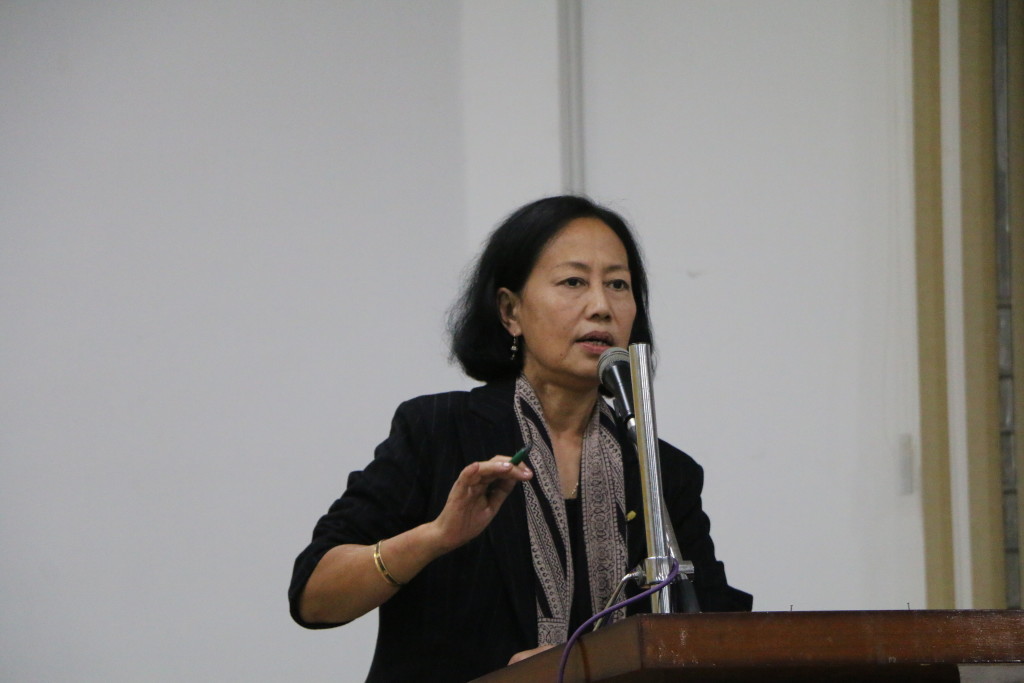
Mamang Dai, Chief Guest delivering her talk during Valedictory Session
Participating in the discussion on the way forward for retention of indigenous culture, former vice chancellor of RGU and founder director of AITS, Prof Tamo Mibang, said several initiatives have been taken by both the university and the government with regard to the promotion of cultural practices but it was seen that there were not many takers. “It is important that communities themselves come forward and engage with the university and the government for these initiatives to be successful,” he said.
Valedictory session in progress
Prof Sukrita Paul Kumar spoke about the need to include culture and folklores in the curriculum to make the younger generations more aware about their culture and identity.
She also suggested that a mentorship programme be initiated, with traditional practitioners as mentors, “which should include curriculum-based participatory learning.”
INTACH ICH Principal Director Nerupama Modwel stressed on the need to create a network of community resources which could evolve into an “organic database.” “The primary challenge is about how to get the youth interested in the discourse on cultural heritage,” she said, adding that promotion and creating awareness were keys to achieve this.
Expressing much satisfaction at the outcome of the deliberations, Modwel said the INTACH was “keen to collaborate further with the AITS in taking forward the dialogue.” Referring to the state cultural policy proposed to be formulated, she expressed hope that the outcomes of the dialogue would find a reflection in the policy.
Elaborating on the process of the event, AITS Director Prof Simon John said it was vital that the resource persons from the communities participated in it and offered inputs towards the recommendations to be formulated.





